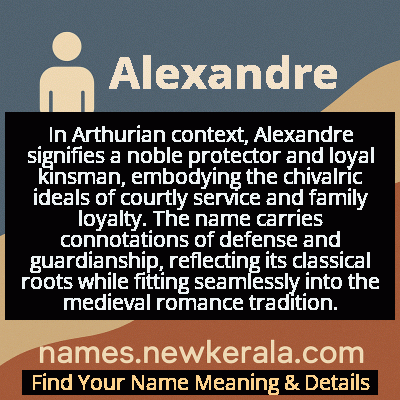Alexandre Name Meaning & Details
Origin, Popularity, Numerology Analysis & Name Meaning of Alexandre
Discover the origin, meaning, and cultural significance of the name ALEXANDRE. Delve into its historical roots and explore the lasting impact it has had on communities and traditions.
Name
Alexandre
Gender
Male
Origin
Arthurian
Lucky Number
3
Meaning of the Name - Alexandre
In Arthurian context, Alexandre signifies a noble protector and loyal kinsman, embodying the chivalric ideals of courtly service and family loyalty. The name carries connotations of defense and guardianship, reflecting its classical roots while fitting seamlessly into the medieval romance tradition.
Alexandre - Complete Numerology Analysis
Your Numerology Number
Based on Pythagorean Numerology System
Ruling Planet
Jupiter
Positive Nature
Optimistic, inspirational, and creative.
Negative Traits
Scattered, exaggerating.
Lucky Colours
Yellow, gold, purple.
Lucky Days
Thursday.
Lucky Stones
Yellow sapphire.
Harmony Numbers
1, 2, 9.
Best Suited Professions
Arts, writing, communication.
What People Like About You
Creativity, optimism.
Famous People Named Alexandre
Alexander the Great
King and Military Commander
Created one of the largest empires in ancient history
Alexander Graham Bell
Inventor and Scientist
Invented the telephone and revolutionized communication
Alexander Pushkin
Poet and Writer
Founded modern Russian literature with masterpieces like 'Eugene Onegin'
Alexander Hamilton
Statesman and Founding Father
Architected the American financial system as first Treasury Secretary
Name Variations & International Equivalents
Click on blue names to explore their detailed meanings. Gray names with will be available soon.
Cultural & Historical Significance
Across cultures, Alexandre has maintained its prestige through centuries, appearing in royal lineages from Russia to the Balkans, and being adopted by intellectuals, artists, and revolutionaries. The name's enduring appeal lies in its perfect balance of classical gravitas and approachable familiarity, making it equally suitable for kings and commoners alike. In literature and art, characters named Alexandre often embody leadership qualities, intellectual depth, and moral complexity, reflecting the name's rich historical and cultural layers that continue to resonate in modern times.
Extended Personality Analysis
Individuals bearing the name Alexandre are typically characterized by a natural authority and protective instinct that aligns with the name's meaning of 'defender of mankind.' They often exhibit strong leadership qualities, combined with intellectual curiosity and strategic thinking that enables them to navigate complex situations effectively. Their confidence is usually tempered by a sense of responsibility and loyalty to those they care about, making them reliable and trustworthy companions. The Arthurian connection suggests a person who values honor and chivalric principles, even in modern contexts.
Beyond the surface confidence, Alexandre's often possess deep emotional intelligence and cultural sophistication. They tend to be well-read, articulate, and appreciative of the arts and humanities, reflecting the name's association with great thinkers and creators throughout history. While ambitious and driven to achieve their goals, they typically maintain a balanced perspective and ethical framework that guides their decisions. Their strength is not merely physical or positional but derives from inner conviction and principled action, making them natural leaders who inspire confidence and respect in others through both their capabilities and their character.
Modern Usage & Popularity
In contemporary times, Alexandre maintains steady popularity across Europe and the Americas, particularly in French and Portuguese-speaking countries where it ranks among the classic, enduring choices for boys. The name has avoided becoming overly trendy or dated, instead occupying a comfortable space as a sophisticated, internationally recognized option that bridges traditional and modern sensibilities. While the spelling 'Alexander' dominates in English-speaking countries, Alexandre is often chosen by parents seeking a more distinctive European flair or cultural connection. Recent decades have seen the name maintain its appeal among educated, cosmopolitan families who appreciate its historical depth and global usability, with its association with intelligence and leadership continuing to make it an attractive choice for parents hoping to instill these qualities in their children.
Symbolic & Spiritual Meanings
Symbolically, Alexandre embodies the archetype of the protector and visionary leader, representing both the strength to defend and the wisdom to guide. The name carries metaphorical weight as a bridge between classical ideals and contemporary values, suggesting someone who honors tradition while embracing progress. In its deepest symbolic resonance, Alexandre represents the human capacity for great achievement tempered by moral responsibility—the conqueror who civilizes, the inventor who connects humanity, the writer who elevates culture, and the statesman who builds enduring institutions. The Arthurian dimension adds layers of courtly virtue and loyal service, making the name a rich tapestry of historical, literary, and ethical symbolism that continues to inspire across generations and cultures.

